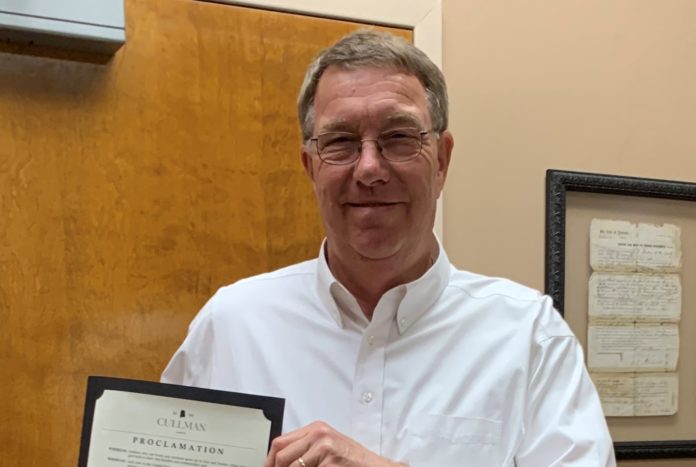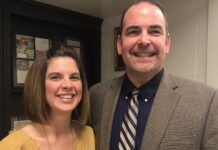CULLMAN, Ala. – Cullman Mayor Woody Jacobs on Tuesday officially proclaimed the month of April 2020 “Child Abuse Prevention Month” in the city of Cullman. In the proclamation, Jacobs challenged all citizens to get involved in the fight against child abuse and neglect and to “take on the risk of improving the quality of life for all children and families in our community.” Javon Daniel, executive director of Cullman Caring for Kids, requested that the mayor issue the proclamation, but a proclamation presentation ceremony was not possible due to the current Order of the State Health Officer Suspending Certain Public Gatherings due to Risk of Infection by COVID-19. Certain activities that are normally planned to bring awareness to this issue are also affected by the order.
However, despite the current conditions in our community and throughout the world, there are still things we can all do to play a role in making Cullman a better place for children and families! A community can have a great influence in families’ lives. Families are more likely to thrive in supportive communities. Features of supportive communities include safe places for children to play; availability of food, shelter, and medical care for families; and a culture that encourages neighbors to get to know and help one another. So we can meet and greet our neighbors, attend parents’ meetings at our children’s schools, participate in local community activities, and even attend local government meetings to highlight the importance of parks, strong schools, and accessible services are for families.
“Finding ways to connect with families is the best thing we can do as a community to strengthen families and prevent child abuse and neglect,” said Jacobs. “We can also familiarize ourselves and others with the signs and symptoms of child abuse and neglect, and report suspected cases to the proper authorities.”
In children, signs and symptoms of abuse or neglect may include:
PHYSICAL OR EMOTIONAL ABUSE
- Sudden changes in behavior or school performance;
- Not receiving help for physical or medical problems;
- Learning problems or difficulty concentrating that cannot be attributed to specific physical or psychological causes;
- Showing extremes in behavior such as being overly withdrawn, compliant, passive, or watchful as though preparing for something bad to happen OR being overly demanding or aggressive;
- Lacking adult supervision;
- Coming to school or other activities early, staying late, and/or not wanting to go home;
- Being either inappropriately adult (parenting other children, for example) or inappropriately infantile (rocking or head-banging, for example);
- Exhibiting delayed physical or emotional development;
- Having unexplained burns, bites, bruises, broken bones, or black eyes;
- Having fading bruises or other marks noticeable after a school absence;
- Seeming frightened of the parents or other adults;
- Reporting injuries by a parent or another adult caregiver.
NEGLECT
- Lacking needed medical or dental care, immunizations, glasses, etc.;
- Begging or stealing food or money;
- Being consistently dirty or having severe body odor;
- Lacking sufficient clothing for the weather;
- Abusing alcohol or other drugs;
- Stating that there is no one at home to provide care.
SEXUAL ABUSE
- Has difficulty walking or sitting;
- Suddenly refusing to change for gym or to participate in physical activities;
- Reporting nightmares or bedwetting;
- Experiencing a sudden change in appetite;
- Demonstrating bizarre, sophisticated, or unusual sexual knowledge or behavior;
- Becoming pregnant or contracting a venereal disease, particularly if under the age of 14;
- Running away;
- Reporting sexual abuse by a parent or another caregiver.
Abusive or neglectful parents may exhibit signs such as:
- Showing little concern for, or appearing indifferent to, the child and refusing to consider offers of help for the child’s problems;
- Denying the existence of, or blaming the child for, the child’s problems in school or at home;
- Asking teachers or other caregivers to use harsh physical discipline if the child misbehaves;
- Seeing the child as entirely bad, worthless, or burdensome;
- Demanding a level of physical or academic performance the child cannot achieve;
- Looking primarily to the child for care, attention, and satisfaction of emotional needs;
- Constantly blaming, belittling, or berating the child;
- Overtly rejecting the child;
- Seeming apathetic or depressed;
- Behaving irrationally or in a bizarre manner;
- Abusing alcohol or other drugs;
- Being unduly protective of the child or severely limiting the child’s contact with other children, especially of the opposite sex;
- Being secretive and isolated;
- Being jealous or controlling with family members.
If you do suspect a child is being harmed, reporting your suspicions may protect the child and get help for the family. For information about where and how to file a report in Cullman, contact local law enforcement (Cullman Police Department – 256-734-1434 | Cullman County Sheriff’s Office – 256-775-4700 | Hanceville Police Department – 256-352-9811) or the Cullman County Department of Human Resources (256-737-5300). You may also contact the National Child Abuse Hotline at 1-800-4ACHILD (800-422-4453).
Also, by ensuring that parents have the knowledge, skills, and resources they need to care for their children, we can prevent child abuse and neglect by creating strong and thriving children, youth, and families in our community. Research shows that protective factors are present in healthy families. Protective factors are conditions or attributes of individuals, families, communities, or the larger society that mitigate risk and promote healthy development and wellbeing. Promoting the following protective factors is one of the most effective ways to reduce the risk of child abuse and neglect:
- Nurturing & attachment;
- Knowledge of parenting and of child and youth development;
- Parental resilience;
- Social connections;
- Concrete supports for parents;
- Social and emotional competence of children.
“Cullman is fortunate to have people and organizations who work to bring awareness to this issue and who help children and families dealing with abuse and neglect,” said Jacobs. “Cullman Caring for Kids, Brooks’ Place, Cullman County CASA, DHR, and others do a great job of providing these much-needed services in Cullman and throughout Cullman County.”
For more information on these agencies, you can visit them online at:
- Cullman Caring for Kids: cullmancaringforkids.com
- Child Advocacy Center (Brooks’ Place): caccullman.org
- Cullman County CASA: facebook.com/cullmancountycasa or www.nationalcasa.org
- Cullman County DHR: dhr.state.al.us





















